Research security, often known as safeguarding research, is a constantly growing challenge at Canadian institutions. The University of Windsor is actively striving to protect researchers and their work.
Know more about
UWindsor Research Security Workshops
-
Stay tuned for new workshops.
Research Security Centre Webinars
Updates
What is research security?
 The ability to identify possible risks to a researcher's work through unwanted access, interference or theft and enact measures that minimize these risks and protect the inputs, processes, and products that are part of scientific research and discovery. Research security is a collective effort - researchers, research institutions, funding organizations, and governments have a shared responsibility to identify and mitigate any potential national security risks related to research.
The ability to identify possible risks to a researcher's work through unwanted access, interference or theft and enact measures that minimize these risks and protect the inputs, processes, and products that are part of scientific research and discovery. Research security is a collective effort - researchers, research institutions, funding organizations, and governments have a shared responsibility to identify and mitigate any potential national security risks related to research.
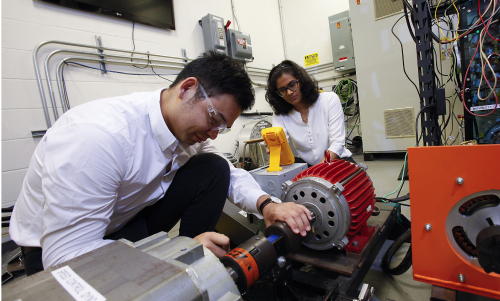
What are the risks?
 If questionable parties obtain your research, the risks include:
If questionable parties obtain your research, the risks include:
- The theft of research data
- The loss of intellectual property
- Misuse of research or knowledge that is considered “dual use”
- Patenting and potential revenue
- Legal or administrative reprisal
- Loss of potential future partnerships or access to research funding
- A tarnished reputation
Why is safeguarding research so important?
 Canadian-led research might be an appealing target for others looking to steal, utilize, and alter it for their own purposes and goals. In certain cases, research might contribute to advances in other nations' strategic, military, or intelligence capacities, or it could be exploited to do intentional harm. Security risks can be mitigated by applying routine due diligence practices. Safeguard your work by:
Canadian-led research might be an appealing target for others looking to steal, utilize, and alter it for their own purposes and goals. In certain cases, research might contribute to advances in other nations' strategic, military, or intelligence capacities, or it could be exploited to do intentional harm. Security risks can be mitigated by applying routine due diligence practices. Safeguard your work by:
- Knowing your industry partners and team members
- Strengthening cybersecurity measures in place
- Employing effective data management processes
- Protecting intellectual property (IP), physical research spaces, and people.

How can you safeguard your research?
Why Research Security matters?
How does the VPRI support research security?
The Office of Vice-President, Research & Innovation (OVPRI) has onboarded its first ever Research Security Coordinator to serve in the Office of Research Partnerships. The Research Security Coordinator advises and supports researchers, ORIS staff, etc. on funding applications, sponsor requirements, and institutional decision-making by assessing risks through the lens of research security, informed by national security and geopolitical security evidence.
The University of Windsor values academic, stakeholder, and industrial partnerships as vital for research advancement, recognizing their impact on the national economy and knowledge development. Global collaborations play a significant role in achieving research excellence. Faculty members and researchers are encouraged to foster collaborations for enhanced research outcomes benefiting the University and the community.
On January 16, 2024, the Government of Canada unveiled its policy on Sensitive Technologies Research and Affiliations of Concern (STRAC), which was adopted by all Tri-Agency and CFI funding programs. This policy stems from the Feb. 14, 2023, announcement by the federal government that would be adopting enhanced posture regarding national research security to reinforce protection for Canada's research, institutions, and intellectual property.
University of Windsor faculty and researchers are strongly encouraged to familiarize themselves with the new policy. This includes a focused understanding of language pertaining to potential risks associated with global collaborations and partnerships, especially those in sensitive technology areas. This heightened awareness will enhance our ability to engage responsibly and knowledgeably in important global collaborative initiatives.
Highlights of the new policy include:
- Grant applications involving sensitive research areas will not be funded if any researchers are affiliated with entities deemed to pose a risk to national security.
- Researchers are encouraged to assess affiliations with Named Organizations of Concern, identify potential risks of continued affiliations, and adopt measures to mitigate them.
- Researchers must understand the due diligence process associated with the provincial and federal research programs. Due-diligence obligations include reviews of partnerships involving dual-use technologies, export controls, high-risk affiliations, and sanctioned entities.
- Researchers must adhere to guidelines, ensuring that their research not only contributes to scientific advancement but also respects the safety, security, and ethical considerations inherent in modern research practices.
- Projects perceived to have a security risk must include a research partnership risk assessment form and personal affiliation attestation.
The University of Windsor recognizes that the new federal policy may affect your research. We are committed to cultivating a research environment that is not only innovative and collaborative but also responsible and secure.
We acknowledge the sensitivity of research security and aim to prevent bias and profiling in risk assessment. In support of this commitment, the University provides consultation, resources, and tools to help researchers identify potential geopolitical and economic risks in sensitive projects, offering assistance in mitigation as needed.
The Office of Vice-President, Research and Innovation, has created an integrated plan to support and guide faculty and staff, including the addition of a Research Security Coordinator to actively train, consult, and support our research community, alongside ongoing support from research coordinators during the granting process.
For inquiries and assistance, please contact Rahul Banerjee, University’s Research Security Coordinator, at researchsecurity@uwindsor.ca and your research coordinator during the granting process.
Additional resources and background on safeguarding research include:
- Safeguarding Research
- ISED – NSERC Risk Mitigation
- Statement from Minister Champagne, Minister Duclos and Minister Mendicino on protecting Canada’s research
- Policy on Sensitive Technology Research and Affiliations of Concern (science.gc.ca)
- Named Research Organizations of Concern
- Sensitive Technology Research Areas
The Office of Vice-President, Research and Innovation prioritizes protecting Canadian research while supporting our research community. The University remains dedicated to advancing bold and impactful research, scholarship, and creative activity.
Policy on Sensitive Technology Research and Affiliations of Concern
On January 16, 2024, the federal government of Canada responded to these risks with an announcement of the Sensitive Technology Research and Affiliations of Concern Policy. This policy clarifies that starting in early 2024, research grant and funding applications submitted by a university or affiliated research institution to the federal granting councils and the Canada Foundation for Innovation involving research that advances a sensitive technology research area will not be funded if any of the researchers involved in activities supported by the grant are affiliated with, or in receipt of funding or in-kind support, from a university, research institute, or laboratory connected to military, national defence, or state security entities that could pose a risk to Canada’s national security. A list of these Named Research Organizations accompanied the announcement.
Find more on the same here: Following STRAC policy at University of Windsor.
Research Security at University of Windsor
UWindsor's research security procedures strive to provide staff and faculty with the knowledge and resources they need to make educated decisions regarding national and international partnerships, allowing them to pursue healthy, transparent, and mutually successful relations. We are offering you training, knowledge, and tools to help you protect your work.
How can we support your work?
1. Education and Training
- Training and helping to conduct open-source due diligence
- Sharing knowledge and resources that will help you comprehend the risk environment.
- Awareness Campaigns to help understand policies.
2. Due Diligence
- Understanding the risk assessment process required for funded grant applications
- Supporting Due-Diligence measures to vet partners according to the National Security Guidelines for Research partnerships More details here: Research Security Guidelines
3. Compliance
- Strategy for Risk Mitigation
- Policy briefings
4. Travel Security
- Traveling while having access to Sensitive information
- Best practices to follow while travelling
Other Resources
General Inquiries:
Rahul Banerjee, Research Security Coordinator


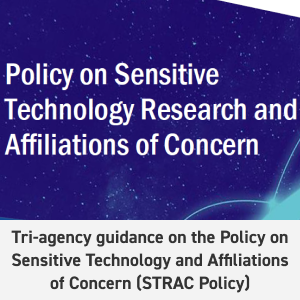


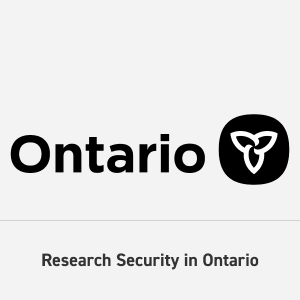
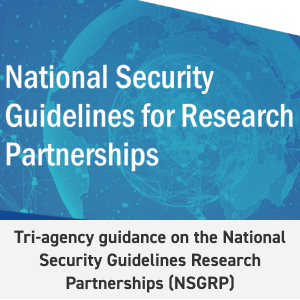
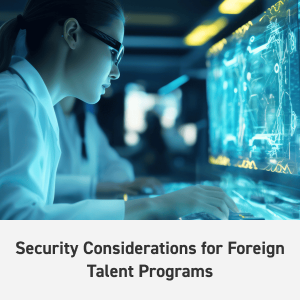


 researchsecurity@uwindsor.ca
researchsecurity@uwindsor.ca 